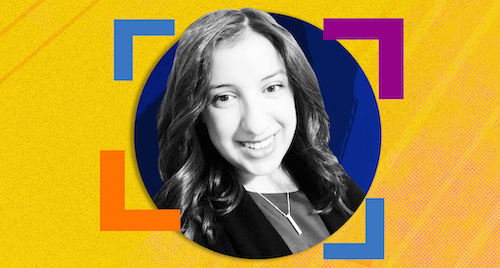
Fatooma Saad is a daughter of immigrants, Marine Corps veteran, mother and first-generation college student.
And, on Dec. 19, she’ll add another title to her life experiences: UM-Dearborn graduate — with honors.
Saad says her path to graduation is a bit nontraditional. She first attempted college after high school, but wasn’t ready. So instead she started a career in banking, joined the military, moved across the country, led young enlisted Marines as a corporal, got married and started her family.
With those experiences and wanting a better future for her son Gabriel, Saad set her sights on earning her college degree in 2018.
“It’s all about pursuing the American dream. I believe that people don’t just do that for themselves, they do it to set the next generation for success — you want your children to have a better life that you did,” she says. “My family did that when they moved here from Lebanon. They didn’t know anyone. My grandmother taught herself English through I Love Lucy and Bewitched. My parents, grandparents and great-grandparents laid the foundation for me to be where I am today and I want to continue building upon what they did for my son.”
To focus on her education and attend school year round, Saad moved back to her hometown of Dearborn for a strong family support system and the next phase of her life. Saad says she wanted to use her 36 months of GI Bill education benefits wisely. So — with a newborn — she consulted with college advisers and planned with husband Evan on how to strategize her academic journey, taking up to seven courses at a time.
First, Saad enrolled at Schoolcraft College to retake and replace low grades she received at 18. “Do not allow your past mistakes to define you. Accept them, learn from them and grow.”
She then transferred her credits to UM-Dearborn to focus on communication; Saad served as a photojournalist and news writer in the military. “I initially joined thinking that I wanted to be a translator since I speak Arabic. But my recruiter Staff Sgt. Rovin Canales saw something in me and suggested mass communication,” she says. “He was right. I learned so much and every day was different. The work I did also gave families a connection into the military world. When my stories were picked up in news outlets or shared on social media, parents in anytown-USA could see their kids’ faces. It was very rewarding.”
Saad also sees the versatility of skills gained through a communications education. “Even if it is not your title, every organization on the planet wants a good communicator.” And she, an advocate for equity and social justice, realizes the power effective communication can have. “You can use your voice to put a spotlight on injustice. Not everyone is comfortable speaking up; but if you are someone who has that ability — and is able to use it — make it count for the people who may not be as fortunate as you are.”
Saad recognizes that effective communicating is a skill that needs to be continuously developed just like any other skill. She understood the importance of focusing in class, utilizing her professors' office hours and taking advantage of communication research opportunities during her time at UM-Dearborn. She also took a variety of courses that explored communication in different fields — like healthcare or business — and ways to best deliver messaging.
She says the diversity of experiences her professors have — news writing, research, public affairs and more — expanded both her knowledge and her network. And when it came to applying for graduate programs, Saad’s UM-Dearborn faculty helped her make connections and wrote letters of recommendation on her behalf. With Saad’s careful planning, she still has GI Bill benefits and will start her Masters in Communication with a concentration in Public Relations and Organizational Communication at Wayne State University in January.
“My professors have all been extremely supportive. Even when I had a toddler crawling on me (during remote classes) while I try to put Elmo on...they get it,” she says with a laugh. “They know how important this is and how focused I am. They want this for me too.”
Reflecting on all she’s experienced while completing her degree, Saad says it was hard. But she wouldn’t change it. She says stories of perseverance — like how her great grandmother, whose husband died, raised children while successfully running a dry good store in 1940s Lebanon or her family coming to America to restart their lives in a new place — are compelling.
And it’s those experiences on which the next generation can build.
“We are not defined by one thing or one title. We are made up of experiences — and all of those helped us gain different perspectives and shape us,” she says. “You learn from your family. You learn from your experiences. You have to learn from your successes and failures. It’s about having an arsenal of things that you’ve learned to improve the space we are in and pass your knowledge to others so they can build something even better.”



